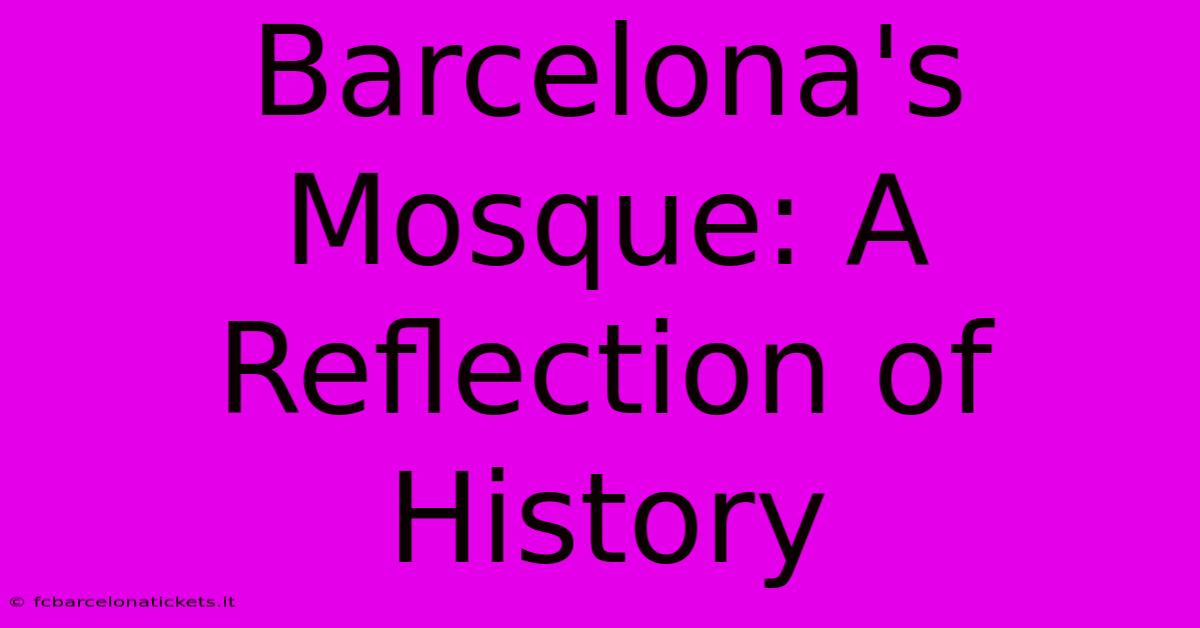Barcelona's Mosque: A Reflection Of History

Table of Contents
Barcelona's Mosque: A Reflection of History
Barcelona, a city renowned for its vibrant culture and architectural marvels, boasts a rich and complex history extending far beyond its iconic Gothic Quarter and Gaudí masterpieces. While often associated with Catholicism, Barcelona's past holds a fascinating, lesser-known chapter: its Islamic heritage. While no grand mosques remain standing today as testament to this period, exploring the remnants of its Islamic past allows us to understand a crucial phase in the city's development. This article delves into the echoes of Barcelona's Islamic period, highlighting the enduring impact of its lost mosques and the historical significance they represent.
The Islamic Presence in Barcelona: A Forgotten Legacy
Barcelona fell under Muslim rule in the early 8th century, following the Umayyad conquest of Iberia. For over five centuries, the city, then known as Barcino, flourished as an important center within Al-Andalus, the Islamic Iberian Peninsula. This period witnessed significant architectural, cultural, and intellectual developments. While much of this heritage was subsequently lost or altered during later Christian Reconquista, traces of Islamic influence remain woven into the fabric of Barcelona’s identity.
The Major Mosques of Barcelona: Echoes of a Lost Past
Unfortunately, no complete mosques from this era survive in Barcelona. The Christian Reconquista in the 11th century led to the demolition or repurposing of most Islamic structures. However, archaeological excavations and historical records provide clues about the existence of several significant mosques:
-
The Great Mosque of Barcelona: This was undoubtedly the most prominent mosque in the city, likely situated in the area of the present-day Cathedral. Its precise location and architectural details remain largely unknown, lost to time and subsequent construction. Historians speculate on its scale and grandeur, imagining a structure comparable to those found in other major Islamic cities of Al-Andalus.
-
Smaller Mosques and Prayer Spaces: Beyond the main mosque, smaller prayer spaces and mosques likely served the city's diverse Muslim population. Their locations remain largely unconfirmed, but their existence points to a vibrant and widespread Islamic community.
Architectural and Cultural Influences: Traces in the Stone
Despite the absence of intact mosques, the enduring impact of Islamic culture on Barcelona is visible in various ways:
-
Urban Planning: The layout of certain areas in the old city may reflect the structure of Islamic urban planning, with its characteristic narrow streets and densely packed buildings.
-
Architectural Details: Subtle Islamic architectural elements might be incorporated into later buildings, though often obscured or modified over centuries of reconstruction and renovations. Careful scrutiny of older buildings could reveal hints of these influences, such as geometric patterns or decorative motifs.
-
Water Management: The sophisticated water management systems developed during the Islamic period likely influenced subsequent urban water infrastructure in Barcelona. This reflects the importance given to water resources in Islamic societies.
Rediscovering Barcelona’s Islamic Past: The Importance of Archaeological Research
Ongoing archaeological excavations in Barcelona are crucial for piecing together a more complete picture of the city's Islamic period. Each unearthed artifact, each architectural fragment, provides invaluable insight into the lives and culture of Barcelona's Muslim inhabitants. This research is not merely an academic pursuit; it’s a vital process of reclaiming and recognizing a crucial, often overlooked, part of the city's identity.
Conclusion: A Multifaceted History
Barcelona's story is not a monolithic narrative. Understanding the city's Islamic past adds a layer of depth and complexity to its rich tapestry. While the grand mosques of this era are gone, their echoes resonate in the city's architecture, urban planning, and the ongoing archaeological discoveries. By actively researching and acknowledging this legacy, Barcelona embraces its complete history, demonstrating a commitment to inclusivity and a deeper understanding of its multifaceted past. Exploring this hidden heritage allows for a richer appreciation of Barcelona’s enduring spirit and the diverse forces that have shaped its identity.

Thank you for visiting our website wich cover about Barcelona's Mosque: A Reflection Of History. We hope the information provided has been useful to you. Feel free to contact us if you have any questions or need further assistance. See you next time and dont miss to bookmark.
Featured Posts
-
Own A Piece Of Footballing History Barcelona 16 17
Apr 02, 2025
-
Unforgettable Encounters Liverpool Vs Barcelona H2 H
Apr 02, 2025
-
Barcelona Jersey 2015 16 Officially Licensed
Apr 02, 2025
-
Coldplay Barcelona Jersey Celebrate Coldplays Legacy
Apr 02, 2025
-
Improve Your Passing Nike Barcelona Ball
Apr 02, 2025
